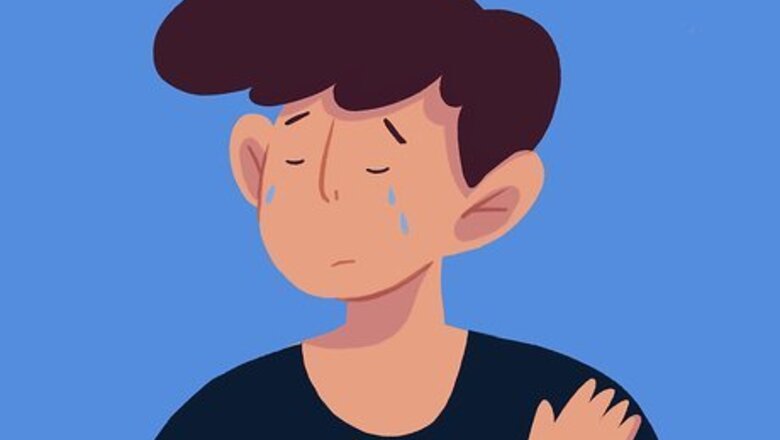
views
Coping Immediately after Death
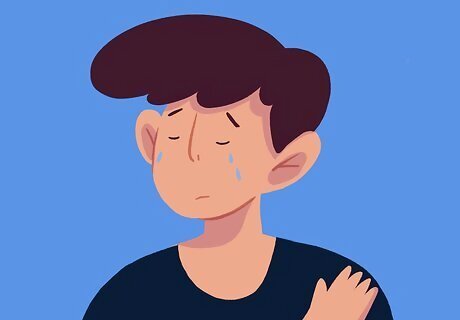
Allow yourself to grieve without judgment. After the death of a loved one it is normal to feel sad, upset, or lost. Don't be angry at yourself for feeling sad, or tell yourself that you should "man up" or get over the loss. Grief is a normal, natural human emotion that helps you cope with death, not something to hide or feel ashamed of. This wasn't your fault, you have no reason to be angry at yourself. In addition to sadness, you may experience other common reactions, such as: Feelings of denial or disbelief about the death Shock or emotional numbness Bargaining or rationalizing how you could have "saved" the deceased Regret for things you might have done Helplessness or hopelessness Anger or irritability Guilt A loss of interest in your usual activities

Remind yourself that there is no right way to grieve. Some people want to cry uncontrollably, while others may fall silent. Some distract themselves with funeral preparations, while others want nothing to do with them. You'll likely hear a lot of advice on "how to feel," but you should know that your grieving process will be your own. Don't let someone tell you how you should feel—acknowledge your feelings and you will find your own ways to deal with them. Tell yourself, It hurts, but i'll be okay. Resist the urge to compare your grieving process to that of others around you. For instance, just because you are not crying as much as someone else does not mean your grief is less valid than theirs. Remember, tears are sadness on the outside. You can still hurt on the inside, even when you aren't showing you're crying.

Make time in your life to process your grief. It is natural to want to push your sadness to the side, distracting yourself with other things and ignoring your emotions. But sadness and anger will creep into your life whether you want them to or not, and the longer you ignore these feelings, the longer it will take them to fade away. Immediately after a loss, take some time off to process your feelings and deal with the myriad stresses that come with the death of a loved one. Sitting down and talking with yourself about your feelings will help a lot. For example, you may need to: Take time off from work. Request time away from school. Clear your schedule to spend time with friends and family.

Accept the help and support of others. Getting emotional and practical support from others is important when you’re grieving the loss of a loved one. If family members or friends offer help, don’t turn them away. Let them know what they can do to help make your life a little easier during this difficult time. For example, you might let them know if they can help in some way with chores, cooking, or making funeral arrangements. Sometimes it can also be helpful to just have someone to talk to or spend time with when you’re feeling sad. Feel free to ask for time alone if you cannot deal with crowds. You need to unpack this event on your own time, however it feels right to you.

Spend time with friends and family. Grieving is often a group process, where friends and family band together to help get over the pain of losing a loved one. Turning to these relationships reminds you that you are not alone in your pain and can help you express your feelings to people who understand and feel them too. For example, you might: Tip: If you don’t have a lot of family or friends to turn to, look into joining a support group for people dealing with grief and loss. Ask your doctor or therapist to recommend a group, or do a search online for “bereavement support groups near me.” Share stories that you have of your loved one. Let people know how you feel, even if it hurts to talk about. Share a meal, activity, or hobby that your loved one enjoyed. Work together to plan the memorial service.

Take care of your body while grieving. There is a strong correlation between physical and mental health, which means a dip in one will affect the other. Do your best to continue to eat healthy meals, work out, and get enough sleep, even if your feel sluggish or uncomfortable. Exercise may seem unappealing when you are dealing with grief, but it is a good way to take your mind off of the loss for a little while and recharge your brain.

Look for positive ways to remember your loved one. Life moves on, but that doesn't mean you must forget the person you've lost. Keep them alive in your memories and remember the good times together. Try to reframe your thoughts so that you remember the good times, not the bad. For example, select a special item of sentimental value to keep close that provides a sense of connection to the one who has passed. You could also try creating a keepsake box or a scrapbook with photos and other memories of your loved one in it. There is a reason why their death was painful, and it is usually because they were such a wonderful, positive presence in your life. Try not to forget this as you grieve. If you have items that belonged to your loved one and you don't want to keep them, consider having a ceremony for the person. Include their possessions in the ceremony as a way to say goodbye to them.
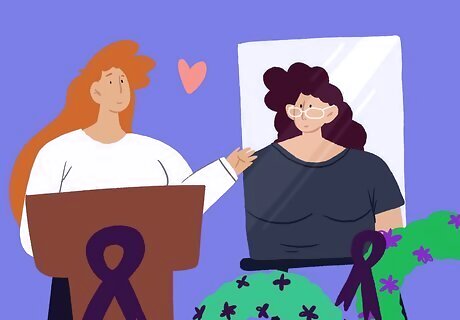
Use the funeral as an opportunity to celebrate your loved one’s life. Your memories of a loved one are likely overpowering, but many of them will be beautiful, poignant, happy moments. Remember and cherish these moments in the funeral service and in daily life. What stories would they want to be told of them? What sort of music would they play at their own party? While planning a funeral is never easy, using this time to remember the good your loved one brought into the world is one of the best ways to remember them and acknowledge your grief.
Moving on with Life

Move forward gradually, on your own timeline. When you're ready, you'll need to accept that your loved one will only live on in your heart and memories. There is no "right" amount of time to grieve; it’s different with every person, and with every loss. So, move on when you are ready. Remember that you are not alone, and you are stronger than you think. It will be hard getting over your loved one, but you need too, in order to move forward. Just always keep them in your heart. The "stages of grief" are guidelines for emotions felt commonly after a death. They are not, however a series of boxes that you must check off, and new research shows that they may not exist at all.

Get back to your daily routine at your own pace. Talk to your boss, teacher, and family about how you are feeling as you readjust to life after the death. Everyone moves at different paces, but everyone needs to get back into the swing of normal life at some point. Some days will be more difficult than others, but being honest with the people around you as you restart the daily grind will help you navigate the "real" world again. While it can be difficult to face the idea of returning to your normal routine, doing so can be comforting and help you feel less overwhelmed in the long run. Try to keep up with at least some of the things you normally do, even if you have to ease back into your regular routine gradually.

Be prepared for "anniversary reactions". These triggered memories of your lost loved one may last for years. This is not a bad or unnatural response. Rather, it is a reminder of how special the person was in your life. Birthdays, holidays, anniversaries, and special days may be hard to cope with for the rest of your life, but don't feel like you are "stunted" because you can't get over them. Even sights and smells can trigger memories of a lost loved one. There are, however, ways to cope: Start a new tradition on that day, potentially tied to their memory (like visiting the grave site). Be prepared with a distraction. Make plans, go out of town, or have friends over. Take time to reminisce. When you find yourself reminded of your loved one, use it as an opportunity to reflect on the fond memories you have of your time with them. You can even write down the memory to help you preserve it.
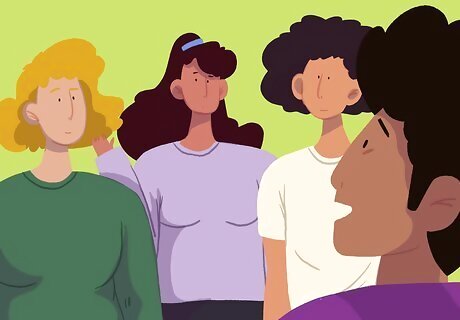
Find a support group to talk about your feelings with others. There are other people who understand you pain and will help you cope with death. A simple Internet search for "grief support groups" in your area can help you find a group near you. There are often groups that deal with specific types of grief or bereavement, such as cancer deaths, the loss of spouses or parents, or moving on after a major loss. The U.S. Health Department has a detailed list of support groups and ways to contact them here: http://healthfinder.gov/FindServices/SearchContext.aspx?topic=833.
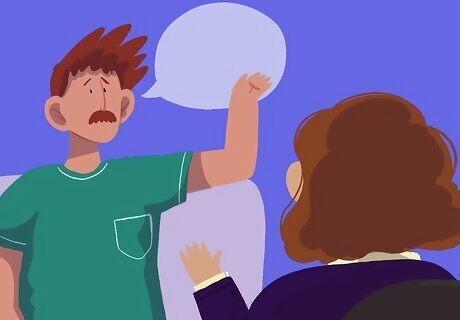
Talk to a counselor if you feel intense grief or sadness that won't go away. Some deaths are too much to handle alone. There are, however, professionals who can help you cope with the death of a loved one, especially if you cannot function or are feeling hopeless. These people will help you come to terms with your grief and understand your intense feelings of sadness. Guidance counselors, school therapists, and mental health professionals can all offer guidance and support while you cope with the death of a loved one. If you are struggling with thoughts of suicide or self-harm, call emergency services or contact your doctor or counselor immediately.
Helping Children Understand Death
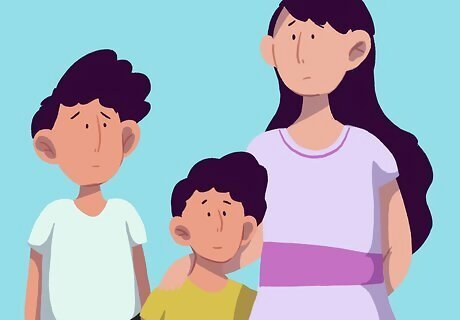
Expect different-aged children to deal with death differently. Older children may be better prepared to cope with death than younger children. Very young children, like preschoolers, may have a hard time understanding that death is permanent, and may instead view it as a temporary separation. Most high schoolers, on the other hand, can understand the finality of death and its causes. Be truthful when discussing the death with your child—minimizing or ignoring negative emotions will only confuse your child later on.
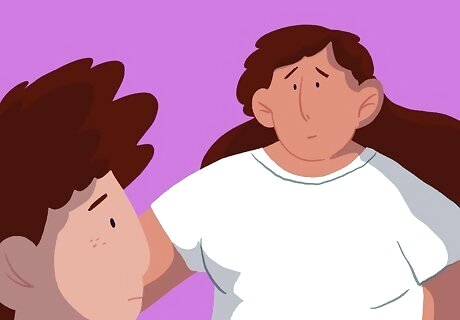
Tell your child the news in simple, plain language. Don't make up stories or wait to tell them "at the right time" for fear of hurting them. Present the news and answer questions in simple and direct terms, without using euphemisms like "lost" or "passed on." For example, you might say, “I have sad news. Uncle Dave died last night.” If a child hears about the death of a loved one from someone else, it may be confusing and unbelievable. The child may not know where to turn for advice if not you. A trusted, familiar loved one should tell your child about the death whenever possible so that they feel safe.
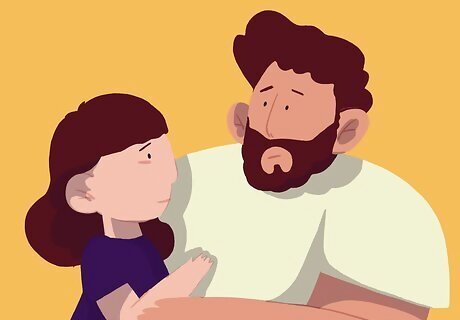
Encourage your child to open up to you. Like many adults, children can have a hard time expressing themselves or knowing when to speak about serious subjects like death. Be sure to encourage them to talk about how they feel, but respect their wishes if they are quiet or uncomfortable at first. Pressuring them to talk will only confuse them more and make it harder to comprehend their grief. Let your child direct the conversation—they will ask the questions that are important to them. This helps you find the right tone and information for their maturity level.

Help solidify positive memories by remembering good times together. Talk to children about the good things that they remember. You can look at pictures from happy moments together, write down stories you enjoy, and make an effort to stay positive. While this is difficult when you are going through grief too, keeping the positive in sight will help everyone cope with the death in a healthy way. If your child wants to talk about happy memories of their loved one, don’t try to change the subject. Having positive conversations about the deceased person is a healthy part of the healing process.

Offer your child the chance to take part in memorial rituals. Letting a child recite a poem at the funeral, pick out flowers, or tell a story lets them feel like a part of the family's grieving process. This can help them have control over their feelings and contribute to the memory of the deceased in a way that is meaningful to them.
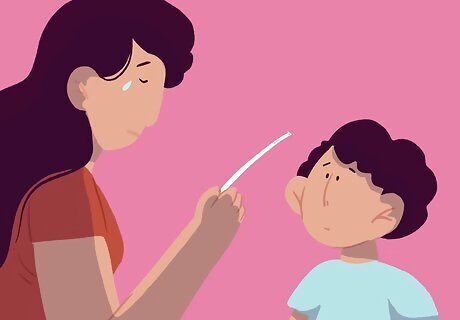
Let yourself grieve as well. Do not feel like you need to neglect your own emotional needs for the sake of your child. Your children will take cues from you and learn to grieve accordingly. If you resist showing emotion, crying, or talking about the death of a loved one, your child will probably do the same thing. Put your feelings into words when talking to your child. This will not only help your child figure out how to express their own grief in a healthy way, but will also show them that what they are feeling is okay and normal. For example, say, “I’m feeling really sad about Grandma right now. I miss her a lot.”
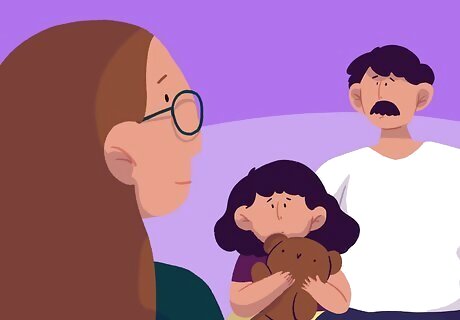
Get professional help if your child is struggling with severe grief. While most children learn to cope with death over time, some deaths hit children particularly hard. When this happens, the advice of a trained mental health professional may be necessary. Keep an eye open for the following symptoms: Trouble performing basic tasks and chores. Regression to earlier childhood behaviors, such as bed wetting or thumb sucking. Persistent irritability, mood swings, or sadness. Low self-esteem and/or confidence. Acting out or misbehaving more than usual. Loss of interest in socializing with others.














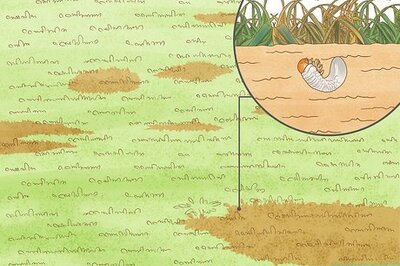




Comments
0 comment